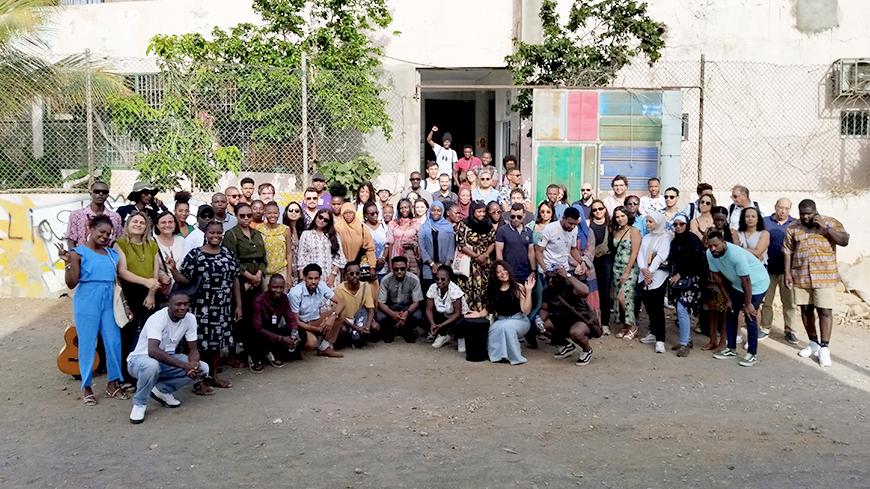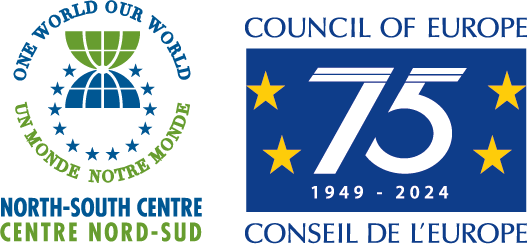This week, the African University on Youth and Development welcomes 80 participants, representatives of youth organisations, who came together in Cabo Verde to explore the theme #ForTheCulture of Human Rights and the Rule of Law.
The opening ceremony on Tuesday morning received institutional support from local, national, and international representatives. Among them were Nelson Moreira, President of the Ribeira Grande Municipal Council; Carla Grijó, Ambassador to the European Union Delegation in Cabo Verde; Jorge Orlando Queirós, Chair of the Youth Steering Committee of the Council of Europe; Rocio Cervera, Deputy Executive Director of the North-South Centre of the Council of Europe and Carlos Monteiro, Deputy Prime Minister responsible for youth and sports in the government of Cape Verde. All emphasized the relevance of educating young people on a culture of human rights and the rule of law in the current geopolitical context.
Four parallel activities, workshops, trainings, and meetings, started in the afternoon, bringing together about twenty participants per session. These groups, composed of young people from different countries working in organisations and networks, facilitate the dissemination of knowledge at local and national levels. The topics addressed include the cooperation in the field of youth between Africa and Europe, the second Rule of Law Youth Network training on the relationship between corruption and environment, the values of social entrepreneurship including human rights, and the abolition of the death penalty. These parallel activities are supported by different partner organisations, such as the Council of Europe Human Rights Directorate, “Ensemble Contre la Peine de Mort”, and the Cabo Verdean Youth and Sports Institute (IDJ).
The second day began with a round table aimed at facilitating exchanges between young participants and experts on the annual theme of this year’s African University on Youth and Development (AUYD). The Minister of Justice of Cabo Verde, S.E. Joana Gomes Rosa Amado, introduced this exchange by emphasizing the relevance of the theme and providing an overview of the national instruments in place to protect human rights and the rule of law in Cabo Verde. She insisted on the role of the state as a facilitator of respect for the rights of popular sovereignty based on democratic values.
Discussions with the round table panellists, including Keagetswe Alex Kgotlaetsile, Head of Education, Youth Division, Women's, Gender, and Youth Directorate of the African Union; Mounir Bensalah, Secretary General of the Moroccan Human Rights Council; Roberta Bojang, Advisory Council on Youth of the Council of Europe, Youth Organization for the European Union and the African Union; Commissioner José Avelino Monteiro Carvalho, National Human Rights Council of Cabo Verde; and Rocio Cervera, Deputy Executive Director of the North-South Centre of the Council of Europe, emphasized the potential of leveraging international conventions as tools among the youth to advocate for human rights and rule of law. The discussion also highlighted the importance of creating discussion spaces in educational structures and through strengthened cooperation between state educational institutions, civil society, and youth actors. This moment also highlighted the importance of the universality of human rights amidst national cultural specificities. In this sense, participants are perfectly positioned to establish these spaces to put into practice the knowledge gained and invigorate initiatives in the over 30 countries represented at the African University on Youth and Development.
The following presentation of the African Union by Keagetswe Alex Kgotlaetsile focused on Agenda 2063, a strategic framework for the socio-economic transformation of the continent over the next 50 years. It delved into the 1 million Next Level Initiative, a project launched in 2022. This initiative aims to reach 300 million young people by 2030 and seeks to empower the youth and drive sustainable development across Africa.
Yesterday, Maria Ángeles de Ramón Ferrando, DG International Partnerships, European Commission, presented the European Union's "Global Gateway" youth engagement strategy and promoted the call for applications to the EU Youth Empowerment Fund through the Global Youth Mobilization, a joint initiative aimed at empowering young people to contribute to the achievement of the Sustainable Development Goals locally within their communities.
The programme of the AUYD also includes activities to connect with local traditions and cultures. For instance, the "Roda de Batuk" a traditional musical and dance expression from Santiago Island, has been organised by IDJ, as well as an historical tour of Cidade Velha, accompanied by tour guides, to discover its patrimony. The cultural, social and artistic Associação Pilorinhu welcomed the participants through an urban art tour and explained ted EU-funded project Xalabas, an occasion to facilitate exchanges and provide an in-depth understanding of the work of civil society in Praia.
The joint program also featured the EU-funded film "Pirinihna," which was screened to initiate a conversation with the participants about child abuse. This discussion included contributions from the director Natasha Craveiro, the producer Emilia Wojciechowska, and the psychologist Dr. Elisabete Silva.
Through various sessions offering both a conceptual perspective, networking opportunities, cooperation, and numerous promising initiatives, through different learning formats, the African University on Youth and Development proves to be a unique platform for training, and cooperation in favour of human rights and the rule of law.
The AUYD is organised in collaboration with the North-South Centre's Network on Youth and Global Citizenship and in the framework of iLEGEND III: Intercultural Learning Exchange through Global Education, Networking and Dialogue, a Joint programme of the European Union and the Council of Europe: co-funded by the European Union and the Council of Europe and implemented by the North-South Centre of the Council of Europe. The overall objective of the project is to increase the active engagement of EU member States, candidates, and potential candidate countries’ citizens (in particular young people) in safeguarding sustainable development and confronting global challenges and inequalities at local and global level. Three activities of the programme also benefit from the Project “Peace YP, promoting Euro-Africa cooperation to enhance youth participation for peace”, financed by the Governments of Malta, Portugal, and Spain.
The 2024 edition is organised with the support of the hosting authorities of Cabo Verde: the Ministry of Youth and Sports, the Ministry of Foreign Affairs, Cooperation and Regional Integration, and Cabo Verde’s Institute of Sports and Youth (IDJ).
To follow the event, join our social media
Global Youth I
North-South Centre I
North-South Centre
Read the Concept Note for more details about about the theme, guests and Programme.
Access the webpage of the AUYD to learn more about the other editions.







